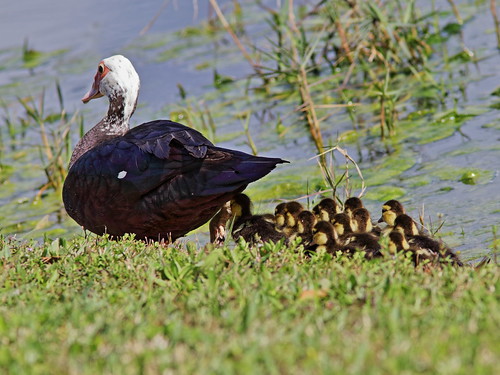

She led them into the water for their first swim:

They clustered around her:
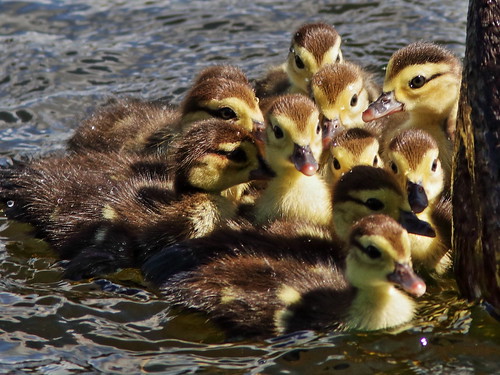
Sadly, it is very likely that the ducklings' numbers will quickly be reduced by predation from Largemouth and Peacock Bass, turtles, herons, hawks, Raccoons and feral cats. They may even be killed by rival male Muscovy Ducks, as I witnessed and reported other instances in this blog, Purposeful Infanticide: Birds killing babies
Our back yard West Indies Mahogany tree has hosted Yellow-bellied Sapsuckers for several winters. We are concerned about the damage they may do and shoo them away as soon as we see them. They fly off, or sometimes just hide on the opposite side of the trunk or in the upper branches. As soon as we go back into the house they are busy drilling their wells and sipping the sap.
Usually we see immature sapsuckers, but this winter an adult female has dominated the tree. She occasionally allows a younger bird to work in her presence.
Female Yellow-bellied Sapsucker:

Hundreds of sap wells, many freshly drilled, cover the trunk and all the main branches of the tree:
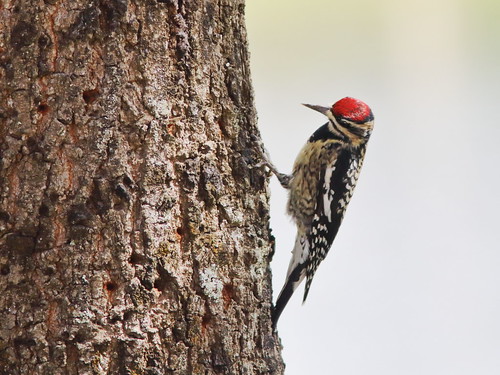
A male Ruby-throated Hummingbird has succeeded in taking over our back yard feeder. Females have defended it every winter, until a few weeks ago when this male appeared:


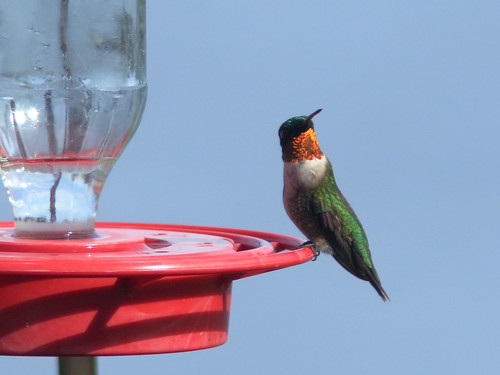
Another back yard visitor, a Great Egret (shot through the window):
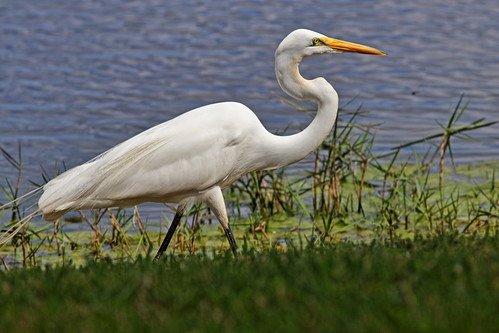
Out in the Wounded Wetlands, the large male Bobcat appeared along the trail on February 13, emerging from the brush not very far ahead of me. I almost did not see him in the deep shade, about an hour after sunrise:


He saw me but seemed rather indifferent as he walked across in front of me, the sun behind him. Obtaining a proper exposure was difficult, so the quality of these photos suffered:

Unflappable, he looked back at me one last time before disappearing on the other side of the track:
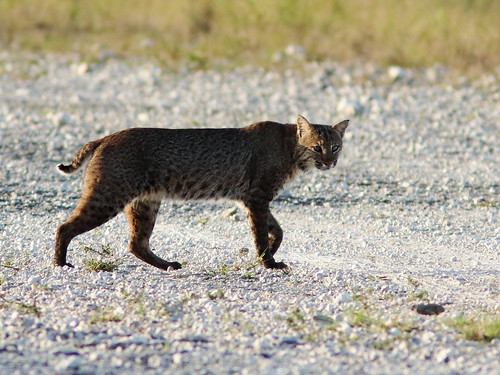
A Loggerhead Shrike stared me down:

At the lake, an Anhinga dried its wings:

An American Kestrel kept watch from high on a Royal Palm spire:
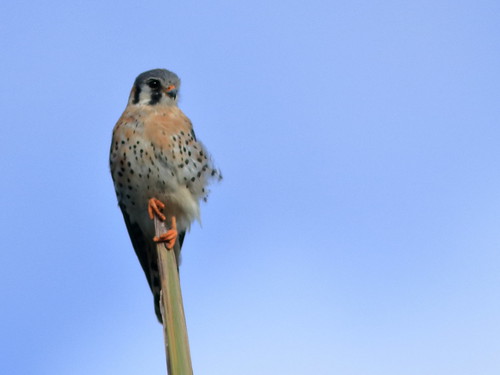
A pair of Mottled Ducks cast reflections on the quiet surface of the lake:
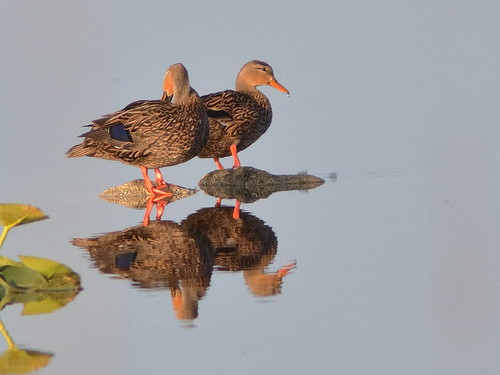
Northern Flickers put on an amazing show. The female called repeatedly from a Royal Palm spire:
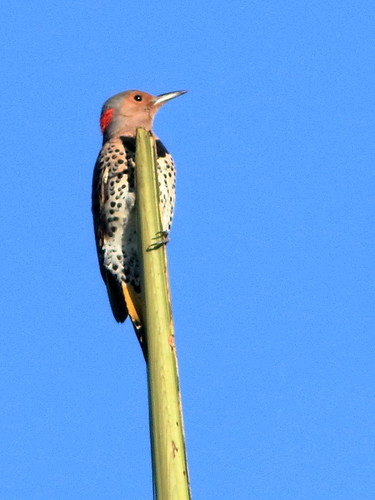
She flew to a tree very close to me and a male joined her, so close that I could not fit all the action into my viewfinder. Typically, the female displays while the male (or sometimes two or three) dance about like fencers. They parry as if there is an invisible sword extending from their bills, usually not coming into physical contact, but darting and swaying, advancing and retreating.
This is tail of the female:

Here she dives down, allowing me one of my few full-body photos:

This was my only (almost) unobstructed view of the male flicker:

A White Ibis probed the earth for worms and insects along the trail:

At Chapel Trail Nature Preserve in nearby Pembroke Pines, two female Painted Buntings appeared:


At Chapel Trail there were nearly a dozen exotic Gray-headed Swamphens, pulling up the Spike-rush to eat their tender roots and shoots:


About 15 years ago, over 3,000 of these invasive swamphens were gunned down because they were reported to kill the young of native birds and also destroy the Spike-rush, a cornerstone species in the wet prairies of the Everglades. I fear that a similar native species may have been easily confused with the dreaded swamphen. Indeed, I found far fewer Purple Gallinules after the extermination campaign. Were they an unintended "by-catch?"
This sub-adult Purple Gallinule, grazing on lotus flowers, has a pale beak. An adult's beak will be bright red with a yellow tip. It is about half the size of a swamphen:

Back on our local wetlands, other critters deserved attention. This is a Horace's Duskywing, on an Ixora flower:

One of the few Monarch butterflies I've seen so far this winter. It may be a member of the local non-migratory population:

I had to kneel down to photograph two tiny butterflies-- Ceraunus Blue...


...and Fiery Skipper:

The view before sunrise, looking back to the east:
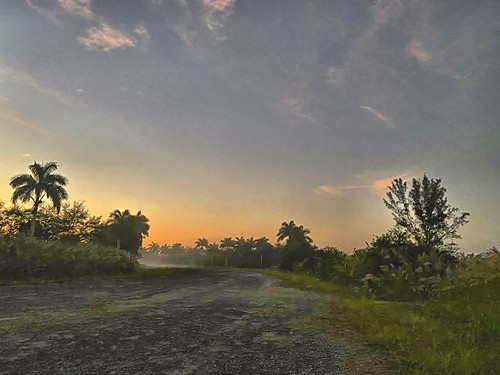
Fog lifting over the Pine Bank:

On the morning of February 18, the Snow Moon eclipsed (occluded) the Red Planet Mars. I actually was unaware of the event, although I noticed a bright heavenly body very close by, the white dot in the lower left of this photo, hand-held (click on photo to enlarge). My Canon 80D has remarkable image stability-- see EXIF* below. The round dot even contained a few red pixels:
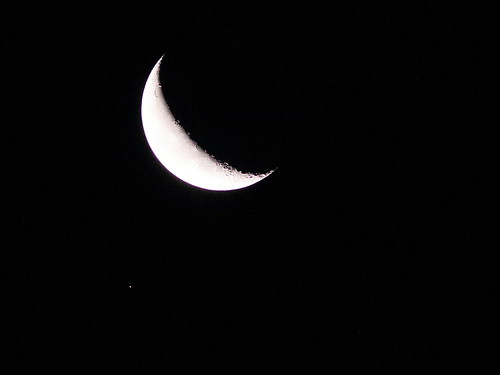
*EXIF for Moon and Mars image:
Camera Model Canon EOS 80D
Shooting Date/Time 2/18/2020 6:05:49 AM (50 minutes before sunrise)
Tv (Shutter Speed) 1/250
Av (Aperture Value) 8.0
Exposure Compensation -1
ISO Speed 6400
Lens EF300mm f/4L IS USM +1.4x
Focal Length 420.0mm
= = = = = = = = = = = = = = =
Linking to :
Fences Around the World
Skywatch Friday
Weekend Reflections
Saturday's Critters
BirdD'Pot
Camera Critters
All Seasons
Wordless Wednesday (on Tuesday)
Our World Tuesday
Good morning, Mr. Kenneth.
ReplyDeleteHow wonderful nature is, and how magnificent your photos are. Congratulations, and thank you for sharing these wonders with us.
I like the moon shot. Thanks for including the EXIF data. Nice to see how you did it!
ReplyDeleteHow wonderful to be able to watch the mother duck taking her little ones for their first swim. Every time I see a Skipper I think of going to my best friend's house as a kid. They loved to hang out around the Lantana plants. - Margy
ReplyDeleteThey are lovely photos, all.
ReplyDeleteWe're so frozen. I'm ready for spring!!!
So many beautiful shots.
ReplyDeleteBeautiful photos! I do hope those ducklings survive! They are so sweet. #AllSeasons
ReplyDeleteHello, The ducklings are adorable. I am not a fan of shooting the birds, I heard they are shooting the Cranes Alabama. So many beautiful birds and photos, I love the Painted Bunting, Hummer, Sapsucker and Flicker. Cool capture of the Bobcat. Beautiful butterflies. Great moon shot. All your photos are lovely. Thank you for linking up and sharing your post.Enjoy your day, wishing you a happy new week ! PS, thank also for the visit and comment.
ReplyDeleteWonderful photos all of them - you saw a bobcat too! The morher duck with her babies is adorable <3
ReplyDeleteas always, your photos are gorgeous - my favorite is the Anhinga
ReplyDeleteI've only seen one purple gallinule...extraordinary images! Of course, that goes without saying. Each and ALL are always delightful as is your narratives each week.
ReplyDeleteThanks so much for sharing your link at I'd Rather B Birdin this week.
Such magnificent images! You are truly gifted.
ReplyDeleteThe 2nd and 4th capture of the ducklings are too cute:) Also love the bright colored humming bird, and the butterflies. Are the more butterflies this year? Your landscape and snow moon are stunning! Always great to see you at the linkylist sharing your captures with All Seasons! Have a wonderful week!
ReplyDeleteMumma duck definitely has her work cut out for her
ReplyDeleteMolly
I love all the shots, especially the mama duck and her babies.
ReplyDeleteAn outstanding series. It may seem odd since I am first and foremost a birder, but I envy you most the sighting of the Bobcat. In an entire lifetime of nature observation I have never been able to find a Bobcat or a Lynx. The Sapsucker will kill the tree ultimately I suppose, but you will have hours of pleasure watching it - a fair trade it seems to me.
ReplyDeleteFabulous variety of awesome birds and other critters, as usual! There is one mama duck in the river behind the house with her lone duckling that she has left from her original 12. I have to tell myself that nature has its own way.
ReplyDeleteThanks for linking up at 'My Corner of the World' this week!
My Corner of the World
Lovely photos. The tail shot sure does show off the lovely colours that you usually don't see.
ReplyDeleteStunning photos! How lucky to capture the bobcat.
ReplyDelete